
Center: Ronnie Goodson
An overlooked group of the early '60s, Ronnie and the Hi-Lites had a short career but a lot of talent
Ronnie and the Hi-Lites

Center: Ronnie Goodson
An overlooked group of the early '60s, Ronnie and the Hi-Lites had a short career but a
lot of talent
![]()
Members:
Ronnie Goodson - lead
Sonny Caldwell - first tenor
John Whitney - second tenor
Stanley Brown - baritone - replaced by Bill Scruggs - replaced by
Richmond Charles
Kenny Overby - bass
Formed in Jersey City, New Jersey, USA in the early 60s, Ronnie and the
Hi-Lites were a doo-wop group best remembered for one recording, the 1962 US Top 20
ballad ‘I Wish That We Were Married’. The group, originally called the Cascades,
initially consisted of tenors Sonny Caldwell and John Whitney, bass singer Kenny Overby
and baritone Stanley Brown. Adding 12-year-old Ronnie Goodson as their lead singer, they
were soon introduced to songwriter Marian Weiss, who offered them ‘I Wish That We
Were Married’. The small Joy Records label picked up the demo recording the group had
made and, renaming the ensemble, released the single. The group released only one other
single for Joy and it was unsuccessful. They recorded a few more singles for Win Records,
without success.
Ronnie Goodson died November 4, 1980 in his sleep, from a brain tumorm at the age of
33.
The Satellites aka
Hollywood Flames

Left to Right:: Leon Hughes, David Ford, Curtis Williams, Bobby Byrd
The Hollywood Flames were one off the West Coast's earliest rhythm and blues groups
![]()
Members:
David Ford - lead
Willie Ray Rockwell - second tenor
Curley Dinkins - baritone
Robert Byrd aka Bobby Day - bass
Long-lasting Los Angeles doo-wop aggregation with a very fluid personnel roster. Bobby Day was one of the group's founders in 1950, and they recorded prolifically for Hollywood, Specialty, Lucky, Swingtime, Money, and other firms before cutting their one major hit, the rocking "Buzz Buzz Buzz," in 1957 for Ebb Records. Earl Nelson, who was later half of Bob And Earl, sang lead on the tune, and some of their subsequent Ebb 45s were rocking novelties. Day went on to solo success with "Rockin' Robin," and the group managed one more chart item, "Gee," for Chess in 1961 with Donald Height as lead. ~ Bill Dahl, All-Music Guide
The Jaguars
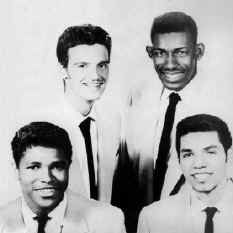
(Clockwise from top left)
Val Poliuto, Charles Middleton, Manny Chavez, Herman Chaney
The Jaguars, were one of America's first rock vocal groups were a very
versitle Los Angeles quartet.interacial
![]()
Members:
Herman "Sonny" Chaney
Val Poliuto - tenor
Manny Chavez - baritone
Charles Middleton - bass
The Jaguars Biography by Bryan Thomas
The Jaguars came together on the campus of L.A.'s Fremont High, home to some of the finest
doo wop groups, including contemporaries like Dootones, Calvanes, Meadowlarks, Medallions,
and Penguins. The school was one of the first high schools in the United States to
integrate their classes, in 1954, and the Jaguars were themselves one of the very first
racially in tegrated vocal groups of the '50s: Texas-born lead tenor Herman Chaney (aka
Sonny Chaney) and Louisiana-born bass singer Charles Middleton were both black, while
Detroit-born second tenor Valerio "Val" Poliuto was white and baritone Manuel
"Manny" Chavez was a Hispanic and the only native Californian in the group.
The group originally called themselves the Miracles (they were one of the first groups to
do so) and recorded a lot of material for John Dolphin's various labels in the
mid-'50s, though no songs were released. (Dolphin was a well-known Central Ave. music
mogul who also owned a radio station, KRKD, which broadcast live from the window of his
Dolphin's of Hollywood record store, in addition to owning numerous small record labels
(including Cash, Money, and others). They moved over to Aardell Records (on Selma Ave.,
Hollywood's Record Row, owned by Bob Ross) in 1955 and began calling themselves the
Jaguars, releasing a few singles under that name for the new label, of which the powerful
R&B ballad "I Wanted You" is one of their best. Their third attempt
succeeded in breaking the group nationally when they covered the Jerome Kern and Dorothy
Fields-penned Broadway tune "The Way You Look Tonight," released in 1956 on the
R-Dell imprint. The group continued to record -- it was reissued no less than five
different times in an attempt to score a national hit, always without success -- but the
failed to chart again. ("The Way You Look Tonight" was a hit when the Lettermen
recorded it a few years later, in 1961).er to Aardell Records (on Selma Ave., Hollywood's
Record Row, owned by Bob Ross) in 1955 and began calling themselves the Jaguars, releasing
a few singles under that name for the new label, of which the powerful R&B ballad
"I Wanted You" is one of their best. Their third attempt succeeded in breaking
the group nationally when they covered the Jerome Kern and Dorothy Fields-penned Broadway
tune "The Way You Look Tonight," released in 1956 on the R-Dell imprint. The
group continued to record -- it was reissued no less than five different times in an
attempt to score a national hit, always without success -- but the failed to chart again.
("The Way You Look Tonight" was a hit when the Lettermen recorded it a few years
later, in 1961).
By 1957, the group moved over to Ebb Records (owned and operated by Lee Rupe, the wife of
Specialty Records' owner Art Rupe . Middleton left the lineup the following year and the
remaining trio recorded "Thinking of You" with his temporary replace ment, L.A.
doo wop icon Richard Berry for Original Sound Records, a new label operated by DJ Art
Laboe. The song also featured a rather stunning falsetto by Tony Allen and became a minor
hit. The Jaguars recorded into the '60s, but finally disbanded after no additional hits.
Chaney and Chavez later worked as a duo. Poliuto occasionally performs at the Southern
California Doo Wop Society.
The Impalas
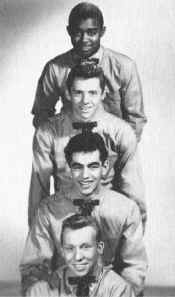
Top to bottom: Joe Frazier, Richie Wagner, Lenny Renda, Tony Carlucci
The Impalas were a Brooklyn vocal group with the distinction of being one of the few white
groups with a black lead singer
![]()
Members:
Joe "Speedo" Frazier - lead
Tony Carlucci - tenor
Lenny Renda - baritone
Richie Wagner - baritone
Artist Biography by Bryan Thomas
The Impalas were a racially integrated vocal group from Brooklyn who are best remembered
for their 1959 hit "Sorry (I Ran All the Way Home)," which scored them their
only Top 20 hit (number two pop, number 14 R&B). Forming in 1958, the group -- Joe
"Speedo" Frazier (the only black singer), Richard Wagner, Lenny Renda, and Tony
Carlucci -- were signed to the Cub label, a subsidiary label of MGM that also issued
high-quality stereo recordings by the Five Satins, the Harptones, the Stereos, the Velours
and the Wanderers, to name a few. In August of 1959, Cub issued an album, Sorry I Ran All
the Way Home, which featured other recordings the Impalas made for the label.
Unfortunately, no further hits ever came, and they disbanded in 1961.
Little Anthony
and the Imperials
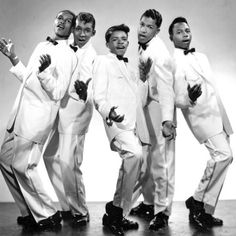
L to R: Glouster Rogers, Tracy Lord, Anthony Gourdine, Clarence Collins, Ernest Wright
Little Anthony and the Imperials is considered one of the best late 50s doo wop
groups. Their first and biggest hit was the million selling "Tears On My Pillow"
(#4 1958.)
![]()
Member:
Anthony Gourdine - lead
Tracy Lord - first tenor - replaced by Sam Strain
Ernie Wright - second tenor
Clarence Collins - bass
Glouster Rogers - baritone
Artist Biography by Steve Huey
Little Anthony & the Imperials enjoyed one of the longest career runs of any doo wop
group, adapting their honey-smooth style to fit the sweet uptown soul sound of the
mid-'60s. Right from the beginning, Little Anthony's aching way with a ballad was the
group's calling card, but their repertoire was balanced by more R&B-inflected dance
tunes. Little Anthony was born Jerome Anthony Gourdine in 1940, and grew up in Brooklyn's
Fort Greene projects. While in high school, he sang in a doo wop group called the Duponts,
who recorded a single called "Prove It Now" in 1957. They disbanded after
graduation, however, and Gourdine joined another group called the Chesters, which had been
formed by his friend Clarence Collins (baritone) and also featured longtime friend Ernest
Wright, Jr. (tenor); the other members were Tracy Lord (tenor) and Nat Rogers (bass).
After a one-off single for Apollo, they landed a record deal with the End label in 1958,
at which point their name was changed to the Imperials. ("Little Anthony" was
later tagged onto the beginning by DJ Alan Freed.)
The Imperials' first single for End was the classic heartache ballad
"Tears on My Pillow," a Top Five smash on both the pop and R&B charts.
Little Anthony's dramatic interpretation was certainly helped in the public eye by his
youthful-sounding voice and name, which recalled the recently popular Frankie Lymon. The
single's B-side, "Two People in the World," was also something of a hit, making
the Imperials one of the hottest vocal groups around. Landing a follow-up hit proved
difficult, however; the group charted several singles -- "So Much,"
"Wishful Thinking," "A Prayer and a Juke Box" -- without even
approaching their earlier success. Finally, the novelty dance track "Shimmy, Shimmy,
Ko-Ko-Bop" caught on in 1960 and returned Little Anthony & the Imperials to the
upper reaches of the charts (though it missed the Top Ten). The follow-ups "My Empty
Room" and "Please Say You Want Me" flopped, however, and Little Anthony
decided to try a solo career in late 1961.
The Imperials continued on with a new lineup of Collins, Wright, Sammy Strain, and George
Kerr, the latter of whom was replaced by Kenny Seymour in 1962. Neither Little Anthony nor
his erstwhile group had any luck on their own, and in late 1963 he returned to the fold,
replacing Seymour. The next summer, the reconstituted Imperials signed with the DCP label,
where producer/songwriter Teddy Randazzo made them a priority. His first effort with the
group, "I'm on the Outside (Looking In)," reached number 15 on both the pop and
R&B charts in 1964, reestablishing the Imperials as a commercial presence. The
follow-up, "Goin' Out of My Head," was a smash, returning them to the pop Top
Ten for the first time since "Tears on My Pillow"; it was covered quite often in
the years that followed, and grew into something of a pop standard. The Imperials' streak
of good fortune continued with the equally dramatic ballad "Hurt So Bad,"
another Top Ten for the first time since "Tears on My Pillow"; it was covered
quite often in the years that followed, and grew into something of a pop standard. The
Imperials' streak of good fortune continued with the equally dramatic ballad "Hurt So
Bad," another Top Ten hit that also became their second R&B Top Fiver in 1965. A
couple of smaller hits followed later that year in "I Miss You So" and the
pop/R&B Top 20 "Take Me Back."
Little Anthony & the Imperials continued to chart singles over the next several years,
but only one -- 1969's "Out of Sight, Out of Mind" -- breached the Top 50 on
either the pop or R&B sides. That same year, the group switched labels to United
Artists, and Ernest Wright, Jr. departed to join singer Tony Williams' latter-day version
of the Platters. He was replaced by a returning Kenny Seymour, who was in turn replaced by
Bobby Wade in 1971, the year of the group's last chart single, "Help Me Find a Way
(To Say I Love You)." Sammy Strain left in 1972 and wound up joining the O'Jays four
years later; his replacement was Harold Jenkins. Little Anthony himself left the group a
second time in 1975 to pursue solo recording as well as an acting career, which
effectively spelled the end of the road; nonetheless, a Collins-led lineup did manage to
score one last hit in the U.K., 1977's "Who's Gonna Love Me." Little Anthony
became a born-again Christian in 1978 and subsequently recorded a gospel album, Daylight.
Anthony, Collins, Wright, and Strain reunited in 1992 and toured the oldies circuit
steadily thereafter.
Little Anthony and the Imperials was inducted into the Rock and Roll Hall of Fame in 2009
The
Jayhawks/Marathons/Vibrations
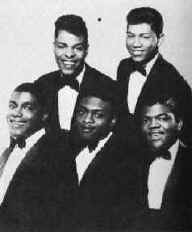
Vibrations
Clockwise from top left
Carl Fisher, Richard Owen, Don Bradley, David Govan, James Johnson
| Members - Jayhawks James Johnson - lead Carl Fisher - second tenor David Govan - baritone Carver Bunkum - bass Richard Owens - first tenor |
Members - Marathons James Johnson Carl Fisher David Govan Don Bradley Richard Owens |
Members - Vibrations James Johnson Carl Fisher David Govan Don Bradley Richard Owens |
Artist Biography by Bryan Thomas
During the late '50s and early '60s, it wasn't uncommon to find doo wop and R&B
singers recording and performing under numerous monikers, often trading out group members
or substituting them at the last moment; everyone was expendable and no one person's
identity created the group itself. The L.A.-based Jay Hawks were one of these acts and are
best remembered for recording the original version of "Stranded in the Jungle"
(1956), a novelty recorded by another group sharing its membership between two
names/record labels, the Cadets/the Jacks.
Carver Bunkum (bass), Carl Fisher (second tenor), Dave Govan (baritone), and Jimmy Johnson
(lead) were high schoolers whose audition of an original, "Counting My
Teardrops," impressed Flash Records' owner, who offered to put up the money to record
it. It wasn't until their second Flash release, "Stranded in the Jungle," that
the group became a success, drawing a lot of local L.A. airplay. "Stranded" was,
incidentally, one of the first instances where a producer did what is called sampling;
that is, the song included sound bites from other popular songs of the day, using the
lyrics of these songs as news bulletins interrupting the verses.
Unfortunately, Modern Records' Joe Bihari rushed his Cadets into the studio upon hearing
their version of "Stranded in the Jungle " and topped the group with his own
release, getting it on radio stations in strong regional markets across the country and
into stores in those areas, before the Jay Hawks even had a chance to make a move. By
doing this, he was actually able to beat them to the punch and therefore was able to
provide his group with their own hit, which charted at number four R&B/number 15 pop
in June 1956.
Quick follow-ups by the Jaw Hawks -- including "Love Train" and the honkin'
"Johnny's House Party" -- failed to chart, however, and by 1960, Bunkum had left
the group to be replaced by Don Bradley (bass) and Richard Owens (first tenor). Along with
the new group members came a new name. Feeling that they wanted to do more ballad material
and that the name "Jay Hawks" was typecasting them as a novelty act, they
decided to call themselves the Vibrations. They scored their own hit with the dance tune
called "The Watusi" (number 25, 1961) for Checker Records.
Meanwhile, multi-talented producer/label head H. B. Barnum had already produced
"Western Movies," (number eight pop and number seven R&B) in 1958 for the
Los Angeles-based Olympics, a flagrant Coasters'-style imitator/rip-off group. Barnum
thought that the Vibrations were the ideal group to record another novelty tune he had
co-written, "Peanut Butter," which he credited the tune to the Marathons.
Unfortunately, Checker Records later discovered what was going on and brought a lawsuit
against the group, Barnum and his record label. As the Vibrations' various members each
had individual contracts with Checker, the label won the rights to market copies of
"Peanut Butter" under their logo.
Not to be denied, Arvee Records promptly secured the rights to the name the
Marathons, rounded up some more singers to record "Peanut"'s successor --
including "Tight Sweater," written by a young Sonny Bono, as the group's
follow-up -- and continued to push the novelty to the masses. Arvee then released a
full-length LP of the Marathons' "Peanut Butter" and some other LP filler, but
this recording failed to further the Marathons' name.
By 1964, the real Jay Hawks/Marathons/Vibrations gradually turned to more romantic
material, although their first hit, "My Girl Sloopy" (number 26, 1964) was
closer to their previous cuts; they also recorded the "original" version of
"Hang on Sloopy," which later would be a huge hit for the McCoys.
The Jay Hawks/Marathons/Vibrations had their last brush with glory in 1968 with the Okeh
Records-released "Love in Them There Hills." Richard Owens was briefly in the
Temptations lineup in 1971, but returned to the fold with the Vibrations who continued on
until 1976, closing out their career as a nightclub act.
The Jesters
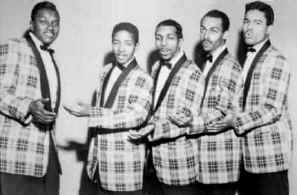
The Jesters 1958
From left: Adam Jackson, Lennie McKay, Noel Grant, Leo Vincent, Jimmy Smith
The Jesters' strong and vibrant street harmonies were an influence on groups for years to
come, primarily in the 60s.
![]()
Members:
Lennie McKay - lead
Adam Jackson - first tenor
Jimmy Smith - second tenor
Melvin Lewis - baritone
Donald Lewis - bass
The archetypal New York street-corner group, with soaring falsetto and
stirring harmonies. With Adam Jackson And Lenny McKay sharing lead duties, The Jesters
recorded several classics of the doo-wop genre for Winley in 1957 and 1958, including
"So Strange" and "The Plea." Jackson recast the group in 1960 for
their last Winley releases, including an accurate remake of The Diablos tune "The
Wind." ~ Bill Dahl, All-Music Guide
The Jive Five
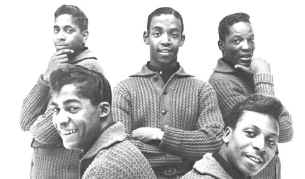
(top l-r) Norman Johnson, Richard Harris and Eugene Pitt
(bottom l-r) Billy Profit and Jerome Hanna
This doo wop group had a number one R&B (#3) pop hit 1961 with "My True
Story," featuring the lead vocal of its writer, Eugene Pitt.
![]()
Members:
Eugene Pitt - lead
Jerome Hanna - first tenor - replaced by Webster Harris
Billy Prophet - second tenor - replaced by Casey Spencer
Richard Harris - baritone
Norman Johnson - bass
Best known for the number one R&B hit "My True Story," the
Jive Five were one of the few vocal groups to survive the transition from the '50s to the
'60s. In the process, they helped move the music itself forward, providing a key link
between doo wop and '60s soul.
Formed in Brooklyn, New York, the group originally consisted of Eugene Pitt (lead),
Jerome Hanna (tenor), Richard Harris (tenor), Billy Prophet (baritone), and Norman Johnson
(bass). The Jive Five's first hit, "My True Story," was their biggest, peaking
at number one on the R&B charts and number three on pop charts in the summer of 1961.
None of the band's subsequent singles -- including the minor R&B hit, 1962's
"These Golden Rings" -- were as popular, but the group managed to keep
performing and recording. Under the direction of Eugene Pitt and Norman Johnson, the Jive
Five refashioned themselves as a soul band in 1964, forming a new lineup with Casey
Spencer (tenor), Webster Harris (tenor), and Beatrice Best (baritone). This new
incarnation of the band signed to United Artists Records. The group only had one hit on
UA, 1965's "I'm A Happy Man."
In 1966, the Jive Five left United Artists and signed with Musicor, where they had the
1968 R&B hit "Sugar (Don't Take Away My Candy)." They changed labels again
in 1970, signing with Decca. That same year, they changed their name to the Jyve Five, in
order to appear more contemporary. The Jyve Fyve had only one minor R&B hit, 1970's
"I Want You To Be My Baby."
The group continued to perform and record for a variety of small labels during the '70s,
but they never had another hit. Throughout the '70s and '80s, the only constant member was
Eugene Pitt. In 1975, Pitt changed the name of the group to Ebony, Ivory, and the Jades,
but this new incarnation failed to gain much attention. In 1982, Pitt changed the name of
the group back to the Jive Five and the band recorded two albums for the indie label,
Ambient Sound. For the rest of the '80s and the '90s, the Jive Five were regulars on the
oldies circuit. ~ Stephen Thomas Erlewine, All-Music Guide